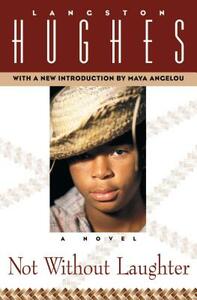Take a photo of a barcode or cover
emotional
hopeful
medium-paced
Plot or Character Driven:
Character
Strong character development:
Yes
Loveable characters:
Yes
Diverse cast of characters:
Yes
Flaws of characters a main focus:
Yes
This was good. I like that not much happens besides normal life. This was so well written too. I never got bored because Hughes made day to day conversations and life moments seem interesting. I loved getting to know more of each characters but through the perspective of Sandy so while not a lot of details were given, you and him could fill in the blanks.
While nothing much happens and there's not much of an over-arching plot other than a boy growing up at a time of racial segregation, there are many, many observations at play and lessons to be considered... on love, on race, on struggle, on loss, on sense of self and much more. I highlighted more than a few sections because they seemed to very accurately describe some of the world's struggles right now. How sad it is that almost 100 years later we still have such division and prejudice... How poignant and beautiful but also tragic that it takes writers and artists to really paint the picture clearly for us. Thank you Langston Hughes.
Yet again, a book I would not have found if not for a reading challenge. I am working on my third year of reading a book related to every sate in the US plus DC. This year I am trying to make as many as possible by BIPOC or LGBTQ authors.
That lead me to Kansas. I had no idea Langston Hughes grew up in Kansas. His first novel, Not Without Laughter, explores the life and coming of age of a poor boy in small-town Kansas. It is hard to believe Hughes was still in his 20s when he published this book.
I found the book so compelling I read it in barely two days. Some chapters are absolutely writing artistry at its best. There is intention in every word, every phrase, every chapter, and in the way the chapters are tied together. This is a special book - add it to your reading list.
That lead me to Kansas. I had no idea Langston Hughes grew up in Kansas. His first novel, Not Without Laughter, explores the life and coming of age of a poor boy in small-town Kansas. It is hard to believe Hughes was still in his 20s when he published this book.
I found the book so compelling I read it in barely two days. Some chapters are absolutely writing artistry at its best. There is intention in every word, every phrase, every chapter, and in the way the chapters are tied together. This is a special book - add it to your reading list.
challenging
emotional
funny
hopeful
informative
inspiring
sad
medium-paced
Plot or Character Driven:
A mix
Strong character development:
Yes
Loveable characters:
Yes
Diverse cast of characters:
Yes
Flaws of characters a main focus:
No
emotional
reflective
slow-paced
Plot or Character Driven:
Character
Strong character development:
Complicated
Loveable characters:
Yes
Immediately after picking this book up, I knew it would change my life. Langston Hughes is one of my favorite black icons from the Harlem Renaissance era, but I had only read his poetry in school. That led me to try his debut novel, Not Without Laughter. I also have to add that the introduction done by Angela Flournoy was magnificent and magnified all of the excellent things Hughes did with this book and how bold it was for its time.
This book was published in 1930, but I was very surprised at how relevant it is today. My favorite part of this book is how real each of the characters felt. As I said earlier, although the book discusses multiple topics of controversy within the black community today, the characters don't feel like a political statement. Nobody from this book is supposed to be "bad" or "wrong", it's just a matter of differing opinions as a result of each character's personal experiences.Sister Johnson hated white people because they burned her village down as a child and treat blacks badly in her present. Meanwhile, Aunt Hager, although a slave, had a somewhat positive experience with the mistress of the house and believes that hating white people will only make your heart ugly. Both of the character's opinions don't invalidate the others and the reader is not necessarily supposed to pick a side, but rather understand each character.
Aunt Hager, Harriet, and Sandy were my favorite characters. I didn't care much for Annjee because while I knew she was trying her hardest and loved her family, it felt like she chose Jimboy, who really ain't nothing, over them. Jimboy was alright, but he really didn't have any connection with his own son who basically idolized him when he was younger. Aunt Tempy also got on my nerves (for obvious reasons) and I hated how she tried to claim Sandy's smarts were thanks to her when in reality Hager was the only one who raised and cared for him. Sandy as a narrator was genius because, as said in the introduction, he has this observant point of view where he's always in the middle of everything. As he got older, I came to really enjoy Sandy.
The portrayal of blackness in this book was also perfect. From the accent and improper English the elders spoke, to the foods described, all of it was so raw and real which was refreshing.
This is the first book in my life where I've felt the need to tab/annotate and I probably will after completing this review. It made me think about the ways of life as an African American. I cried so much and gained so many new perspectives after reading this. I would highly recommend this book to other black people, specifically ADOS. Loved it and can't wait to read more from Hughes!
This book was published in 1930, but I was very surprised at how relevant it is today. My favorite part of this book is how real each of the characters felt. As I said earlier, although the book discusses multiple topics of controversy within the black community today, the characters don't feel like a political statement. Nobody from this book is supposed to be "bad" or "wrong", it's just a matter of differing opinions as a result of each character's personal experiences.
Aunt Hager, Harriet, and Sandy were my favorite characters. I didn't care much for Annjee because while I knew she was trying her hardest and loved her family, it felt like she chose Jimboy, who really ain't nothing, over them. Jimboy was alright, but he really didn't have any connection with his own son who basically idolized him when he was younger. Aunt Tempy also got on my nerves (for obvious reasons) and I hated how she tried to claim Sandy's smarts were thanks to her when in reality Hager was the only one who raised and cared for him. Sandy as a narrator was genius because, as said in the introduction, he has this observant point of view where he's always in the middle of everything. As he got older, I came to really enjoy Sandy.
The portrayal of blackness in this book was also perfect. From the accent and improper English the elders spoke, to the foods described, all of it was so raw and real which was refreshing.
This is the first book in my life where I've felt the need to tab/annotate and I probably will after completing this review. It made me think about the ways of life as an African American. I cried so much and gained so many new perspectives after reading this. I would highly recommend this book to other black people, specifically ADOS. Loved it and can't wait to read more from Hughes!
Graphic: Hate crime, Racism
Moderate: Death, Slavery
Reading the first chapter I was reminded of another Kansan's work - Gordon Parks' The Learning Tree. I discovered the Hughes books came first, and that is where the similarities end. Parks takes more of To Kill a Mockingbird route while Hughes goes more into family relationships and education. All emotions are easily experienced while reading this novel - happiness, sadness, anger, frustration, laughter, and satisfaction.
challenging
emotional
slow-paced
Plot or Character Driven:
A mix
Strong character development:
Yes
Loveable characters:
Complicated
Diverse cast of characters:
Yes
Flaws of characters a main focus:
Yes
I think there's a reason we remember Langston Hughes as a poet instead of a novelist.
note: read for ENGL 389R - American Literature after 1800
note: read for ENGL 389R - American Literature after 1800
emotional
hopeful
reflective
medium-paced
Plot or Character Driven:
Character
Strong character development:
Yes
Loveable characters:
Yes
I knew absolutely nothing about this book going in (thanks reading challenges!) and I hadn’t expected that I would like it this much. Coming of age novels aren’t really my thing usually, but the way this one was written?? The characters all had such distinct voices and I truly felt for Sandy at times. Also very interesting to read the different perspectives on being black in a Jim Crow-America and what exactly is considered a ‘succes story’.





